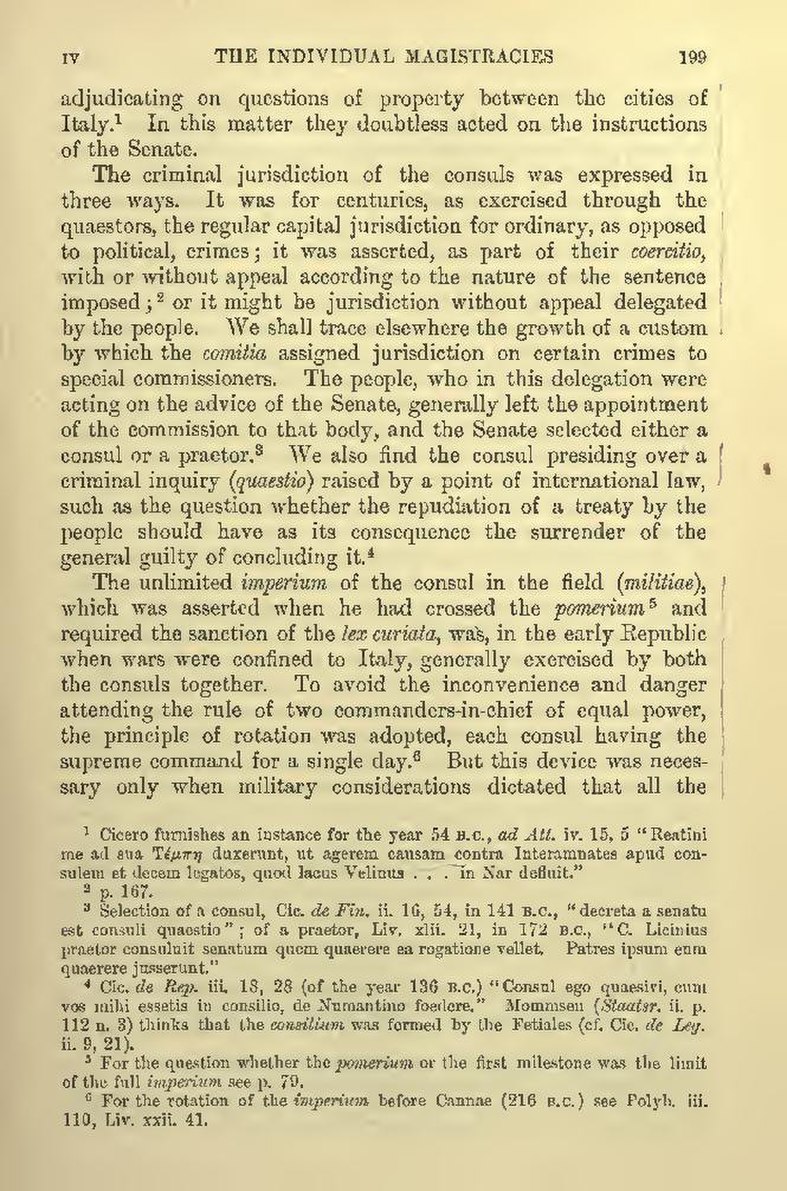adjudicating on questions of property between the cities of Italy.[1] In this matter they doubtless acted on the instructions of the Senate.
The criminal jurisdiction of the consuls was expressed in three ways. It was for centuries, as exercised through the quaestors, the regular capital jurisdiction for ordinary, as opposed to political, crimes; it was asserted, as part of their coercitio, with or without appeal according to the nature of the sentence imposed;[2] or it might be jurisdiction without appeal delegated by the people. We shall trace elsewhere the growth of a custom by which the comitia assigned jurisdiction on certain crimes to special commissioners. The people, who in this delegation were acting on the advice of the Senate, generally left the appointment of the commission to that body, and the Senate selected either a consul or a praetor.[3] We also find the consul presiding over a criminal inquiry (quaestio) raised by a point of international law, such as the question whether the repudiation of a treaty by the people should have as its consequence the surrender of the general guilty of concluding it.[4]
The unlimited imperium of the consul in the field (militiae), which was asserted when he had crossed the pomerium[5] and required the sanction of the lex curiata, was, in the early Republic when wars were confined to Italy, generally exercised by both the consuls together. To avoid the inconvenience and danger attending the rule of two commanders-in-chief of equal power, the principle of rotation was adopted, each consul having the supreme command for a single day.[6] But this device was necessary only when military considerations dictated that all theduxerunt, ut agerem causam contra Interamnates apud consulem et decem legatos, quod lacus Velinus . . . in Nar defluit."]
- ↑ Cicero furnishes an instance for the year 54 B.C., ad Att. iv. 15, 5 "Reatini me ad sua [Greek: Tempê
- ↑ p. 167.
- ↑ Selection of a consul, Cic. de Fin. ii. 16, 54, in 141 B.C., "decreta a senatu est consuli quaestio"; of a praetor, Liv. xlii. 21, in 172 B.C., "C. Licinius praetor consuluit senatum quem quaerere ea rogatione vellet. Patres ipsum eum quaerere jusserunt."
- ↑ Cic. de Rep. iii. 18, 28 (of the year 136 B.C.) "Consul ego quaesivi, cum vos mihi essetis in consilio, de Numantino foedere." Mommsen (Staatsr. ii. p. 112 n. 3) thinks that the consilium was formed by the Fetiales (cf. Cic. de Leg. ii. 9, 21).
- ↑ For the question whether the pomerium or the first milestone was the limit of the full imperium see p. 79.
- ↑ For the rotation of the imperium before Cannae (216 B.C.) see Polyb. iii. 110, Liv. xxii. 41.
